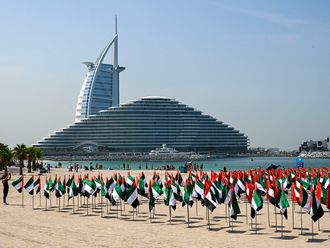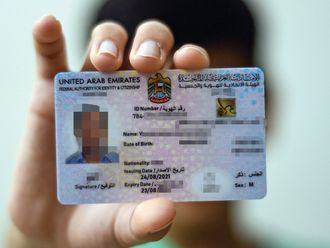
Dubai: Looking to work as a professional in the UAE, but want to go freelance? The UAE offers multiple options for entrepreneurs as well as professionals to set up their one-person operation, or start a company with 100 per cent ownership, but there are regulations and approvals that you need to be aware of, in order to keep your business within the legal framework.
A Gulf News reader wrote in, sharing his plans to start life in the UAE as a mobile barber.
He said: “I am moving to Dubai in September with my wife and two children. I am looking to be a mobile barber, I have been trying to find out what licenses I will need and how to sponsor my wife and children. I hope you can help me in the right direction.”
Gulf News spoke with business set-up experts in the UAE to find out what the options are for someone looking to start a mobile barber business or any similar salon service in the UAE.
Option 1: Mainland barber shop
According to Awatif Shaikh, Business Development Manager at Consult Zone Business Solution Experts, anyone looking to offer mobile aesthetics services would need to first set up a brick-and-mortar shop, with the mobile service option as an add-on to the main registered licence for the shop.
The first step in this process would be to get a business licence with the relevant business activity.
“An investor must first form an establishment on Dubai mainland. It involves registering themselves with Dubai’s Department of Economy and Tourism (DET). This step is known as the initial approval of the investor, which includes establishing the business activity that they would like and also their own profile with the DET. They must then zero-in on a shop that they can use to set up their salon. However, the investor in Dubai who wants to provide mobile services will have to opt for a full-fledged salon licence. The activity itself must be ‘Gents Haircutting and Hairdressing Salon’ or ‘Women Salon’,” she said.
Once your initial approval is in place, the next step would be to get the approval from Dubai Municipality.
“Any businesses offering beautification and hygiene services are regulated by the Dubai Municipality. Hence to complete this licence, the space that the investor chooses must be inspected by the Dubai Municipality. At the time of inspection, the investor must be present at the shop with a small business plan, which would include the services that he intends to provide along with the cosmetics that would come in use. The Dubai Municipality would take up to three to four days to issue an approval after which, the investor can complete the licence application from DET,” she added.
The business can be up and running after that and the person can offer his or her services at home as well. Responding to the reader’s query on how he can sponsor his family, Shaikh said: “The investor is eligible for a residence visa after his business setup in Dubai. Once, his visa is issued, he can sponsor his family and get residence visas for them too.”

Any businesses offering beautification and hygiene services are regulated by the Dubai Municipality. Hence to complete this licence, the space that the investor chooses must be inspected by the Dubai Municipality.
Getting your business proposal right
When getting a municipality approval, Faizan Khan, Marketing Manager at Consult Zone Business Solution Experts, explained how to create your business proposal and build your profile.
“As there is no business activity specifically for a ‘mobile barber’, you would need to apply for a regular licence and then take an approval from the municipality and show them the business proposal. If the person has experience in the industry in other parts of the world, this can also be added in along with any website or profile they may have. Based on this, we can get an approval for a barber shop and the company would have to be on the mainland,” Faizan said.

As there is no business activity specifically for a ‘mobile barber’, you would need to apply for a regular licence and then take an approval from the municipality and show them the business proposal. If the person has experience in the industry in other parts of the world, this can also be added in along with any website or profile they may have. Based on this, we can get an approval for a barber shop and the company would have to be on the mainland.
How much would a licence cost?
“When we set up a company, we have to consider four main costs - the licensing cost, your visa cost and the visa cost for employees, and then the shop infrastructure,” Steven Charles Wilson, Senior Business Consultant Axiom Mark business consultants, said.
He went on to explain how different things can affect the licence cost.
“The cost of a licence will come up to anywhere between Dh12,000 to Dh15,000, as it can vary depending on various factors. If you are using a foreign name not an Arabic trade name, or using a regional word, like ‘international’ or ‘global’ you pay an additional fee for that. Similarly, if you have more than one partner, the cost increases with Dh1,000 per partner. But, the most important thing is the rent you are going to pay, as five per cent of the rent value is added as a market fee to the licence,” he said.
Breaking down the visa costs, Wilson said that a two-year investor visa roughly costs Dh3,500.
“Similarly, if he wants to have employees, he will have to get his licence registered with the Ministry of Human Resources and Emiratisation (MOHRE) after which he will be able to hire an employee, which would again cost between Dh6,000 and Dh7,000, valid for two years. The cost for employee visas is slightly higher in this industry, as the medical tests are different for them, because they are more hygiene related fields,” he said.
“Overall, this whole process will take a week to 10 days, when the entire set up will be incorporated,” he said.
Option 2: Work with an existing salon
Wilson also recommended a second option that people can consider – work with an already established salon to offer the at-home services.
“If they just want to test the waters, what they can do is have an internal agreement with a running business. This saves them the incorporation cost and they can try out the services. If they see a good demand over here, they can enter the industry by setting up the business separately,” he said.
“When you do set up your own business, you just need to make sure you find the right jurisdiction [free zone or mainland], find the right area and shortlist the place,” he added.

If they just want to test the waters, what they can do is have an internal agreement with a running business. This saves them the incorporation cost and they can try out the services. If they see a good demand over here, they can enter the industry by setting up the business separately.
Option 3: Get a free zone licence
Another option that people can consider is setting up a free zone business, through which they can offer services in the aesthetics industry.
“For a mobile barber specifically, there are two different ways in which it can be conducted – one is with a van, where you have a setup, with the interior modifications that look like a salon, with facilities like a sink, mirror, chair etc. Such a van would need an approval from the Roads and Transport Authority (RTA) as well as Dubai Municipality and in this case, he would need to take a mainland licence,” Zamir Khan, Sales Manager, ExpressPRO corporate services, said.
“The second option is providing the service on-call at people’s home. Both of these can considered mobile barber services. When we talk about the home services, these can be done under a free zone licence, which is very cost effective. He can take a visa for himself and sponsor his dependent’s visa as well,” he added.
When trying to find a free zone that offers such a licence, Khan recommended looking for free zones that offer business activities like ‘hair service’, ‘hair dresser’ or ‘hair stylist’.

When we talk about the home services, these can be done under a free zone licence, which is very cost effective. He can take a visa for himself and sponsor his dependent’s visa as well.
Once the licence is applied for, a person can set up an online portal, like a website or app, through which they can promote their services.
“A lot of the freelancers who are providing henna services or parlour services go for this option. This is very common,” he said.
The cost, too, can be lower than a mainland licence, and the person is free to offer the services anywhere in the UAE.
As for the cost, Khan clarified that several factors would, once again, affect the final amount.
“It depends on his requirement. For example, if he is going for the free zone licence with a single investor, the total cost will be around Dh17,000 to Dh18,000. If they want two visas, the package cost increases to approximately Dh24,000. As the number of visas increases, the package cost increases as well. If, on the other hand, you already have a visa, like you are on your family visa, the licence cost is much lower – around Dh7,000 to Dh8,000,” he said.









